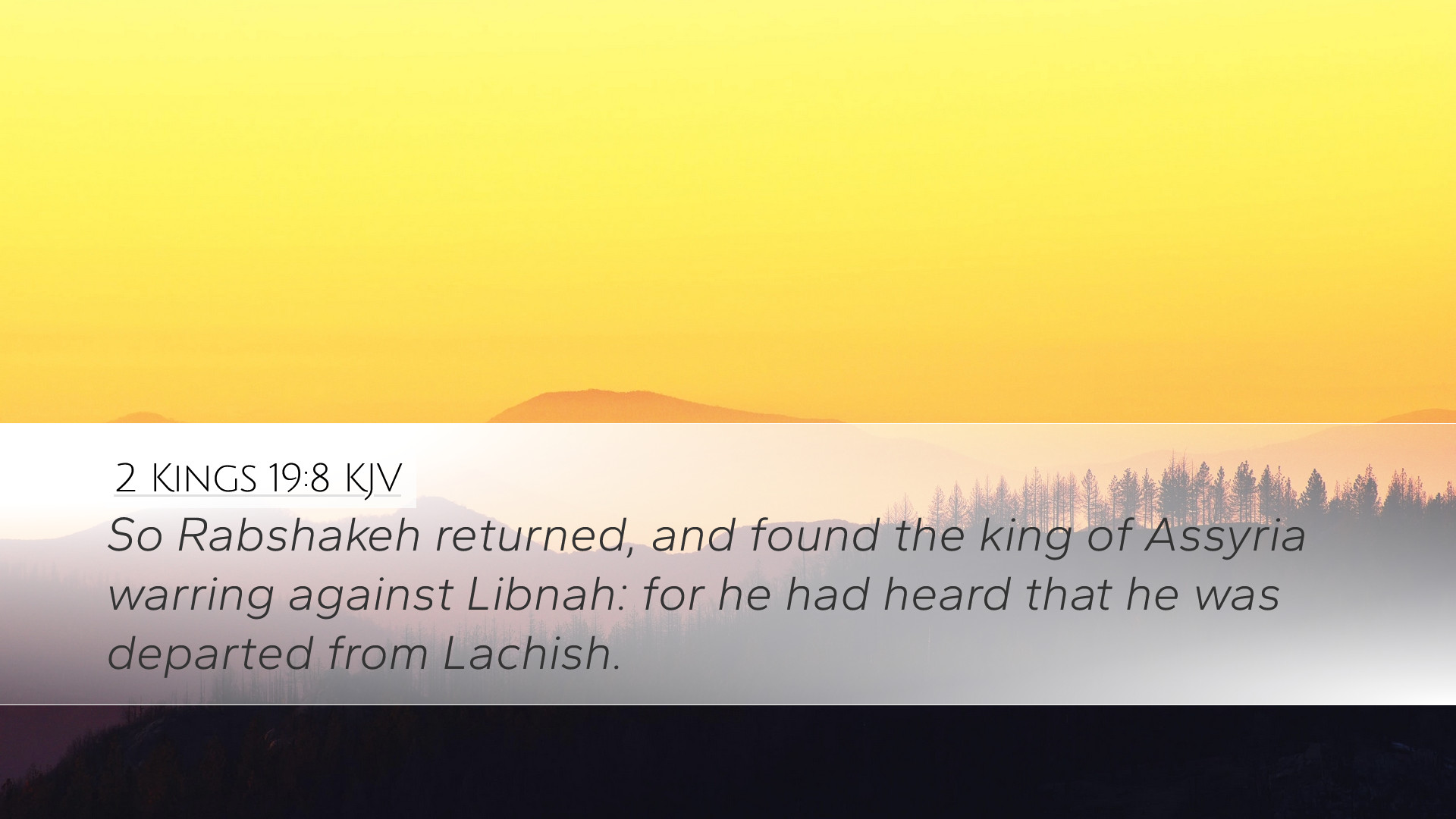Commentary on 2 Kings 19:8
Verse Context: The verse "So Rabshakeh returned and found the king of Assyria warring against Libnah; for he had heard that he was departed from Lachish." highlights a significant moment in the conflict between the Assyrian empire and the kingdom of Judah during the reign of King Hezekiah.
Overview of the Historical Background
This passage occurs amidst a broader narrative of the Assyrian siege on Jerusalem. Hezekiah is depicted as a faithful king, contrasting with his predecessors who led Israel into idolatry. Assyria, under King Sennacherib, represents a dominant power threatening the very existence of Judah.
The Assyrians were notorious for their military prowess and ruthless tactics. The mention of Rabshakeh, a high-ranking Assyrian official, suggests the psychological warfare that characterized Assyrian diplomacy—intimidating enemies through threats and despair.
Insights from Commentary by Matthew Henry
Matthew Henry emphasizes the providence of God in the narrative. He indicates that Rabshakeh's return to Sennacherib at Libnah illustrates the shifting dynamics of power. This moment serves not only as a tactical withdrawal but also as a sign of God's sovereignty over the affairs of nations.
Henry notes that the engagement of the Assyrian forces at Libnah signifies a diversion of attention, providing Judah an opportunity for deliverance. He underscores the importance of faith in God during times of uncertainty, suggesting that Hezekiah’s reliance on divine intervention ultimately led to Judah's preservation.
Insights from Commentary by Albert Barnes
Albert Barnes provides a detailed examination of the geopolitical implications of this verse. He clarifies that the reference to Rabshakeh's finding the king at Libnah can be interpreted as an indication of the Assyrian campaign's adaptability and its logistical challenges.
Barnes draws attention to the Assyrian strategy, which involved rapid movements and engagements at multiple fronts. By abandoning Lachish for Libnah, Sennacherib demonstrated the unpredictability in warfare and the necessity for Judah to remain vigilant.
Furthermore, he articulates that the mention of Rabshakeh's action indicates a tactical pause, reinforcing the importance of prayer and reliance on God by Hezekiah. Barnes connects this to the broader theme of divine providence in human affairs, suggesting that faith during conflict is paramount to receiving God’s favor.
Insights from Commentary by Adam Clarke
Adam Clarke provides a thorough exegetical analysis of the term 'Rabshakeh' and the significance of his position. Recognized as a chief spokesman for the Assyrian king, Clarke elucidates the implications of Rabshakeh's rhetoric as it played a pivotal role in demoralizing the people of Jerusalem.
Clarke also emphasizes the geography of the conflict, noting that Libnah was a strategically important site. The Assyrians' military engagements in this locale signify their relentless pursuit of territorial expansion, casting a shadow over Judah’s fate.
Moreover, Clarke highlights the transition of Assyrian efforts as they shift locations—this changing backdrop serves as a metaphor for the trials faced by believers. He encourages readers to reflect on the nature of spiritual warfare, signifying that, like Hezekiah, one must confront adversity with steadfast faith and reliance on God's promises.
Theological Reflections
The theological implications of this passage are manifold, presenting a rich tapestry for exploration by pastors and theologians.
- God's Sovereignty: The movement of Rabshakeh from Lachish to Libnah reinforces the notion that God is in control of all events, even those that appear to be setbacks for His people.
- Faith in Crisis: This narrative serves as a testament to the importance of sustained faith amid trials. As Hezekiah faced the Assyrian threat, his actions reveal a model of seeking divine support against overwhelming odds.
- God’s Deliverance: The backdrop of military siege illustrates a profound truth about divine rescue. Reflection on this passage can lead to discussions about how God often intervenes in unexpected ways to save His people.
Practical Applications
Pastors and leaders can derive several practical applications from this verse:
- Encouragement in Trials: Just as Hezekiah faced dire circumstances, congregations can be reminded that God is working on their behalf even when circumstances seem dire.
- Urgency of Prayer: The narrative underscores the need for believers to present their cases before God earnestly, especially in contemporary spiritual warfare contexts.
- Awareness of God’s Movement: Encourage congregants to be spiritually alert to the shifts in their lives, recognizing when God is moving them from one challenge to a new opportunity for growth or deliverance.
Conclusion
2 Kings 19:8 offers profound insights into the relationship between God and His people during crises. The reflections by Matthew Henry, Albert Barnes, and Adam Clarke elucidate the importance of divine providence, the nature of spiritual warfare, and the necessity of faith amid troubling circumstances. As pastors, students, and scholars engage with this text, they are reminded of God's unwavering sovereignty and the hope that believers possess regardless of the trials they face.


